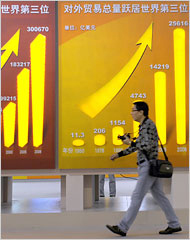|
HONG KONG — Asian economies slumped steeply when exports plunged during the winter, but most of the region is now rebounding quickly, the Asian Development Bank said in a report released on Tuesday.

Liu Jin/Agence France-Presse
Posters show China's rising growth in an exhibit in Beijing that highlights the country’s economic achievements. China is on-track to grow more than 8 percent in 2009.
The multilateral institution, based in Manila, declared that economic growth in China would be 8.2 percent this year, 1.2 percentage points higher than the bank’s forecast in March, and 8.9 percent next year.
The bank raised its 2009 growth forecast for India to 6 percent, from 5 percent predicted in March, and for developing Asian countries as a group to 3.9 percent, from 3.4 percent.
“Developing Asia is proving to be more resilient to the global downturn than was initially thought,” the bank said in a statement accompanying its semiyearly assessment.
A common factor among countries doing better than expected is that they have been able to offset weak exports by stimulating domestic demand more than anyone expected. Chinese banks have lent heavily, while the Indian government has gone on a spending spree.
Commercial banks across most of the region also came into the global financial crisis with mostly strong balance sheets, having become much more cautious after the Asian financial crisis in 1997 and 1998.
Taiwan, whose export-dependent economy has limited scope for increasing domestic demand, and Kazakhstan, whose banks lent too much as oil prices soared over the last several years, were among countries that had their growth forecasts downgraded in the report.
The speed of the recovery in Asia has renewed a debate over “decoupling” — the idea that growth in the region is becoming less closely correlated with that of the West. Some commercial banks have promoted the concept to suggest that Asian economies, and their stock markets, have become more stable and worthy of investment.
But Ajay Kapur, chief of global strategy and economics at Mirae Asset Securities, one of South Korea’s biggest financial services companies, said Asian economies might now be showing even wider swings in economic output in response to changes in the West.
“Economies tied to global trade fell harder in the crisis and are bouncing back with more vigor,” he said. “This is the opposite of decoupling.”
Jong-wha Lee, the chief economist of the Asian Development Bank, said the region had shown during the Asian financial crisis in 1997 and 1998 that it was too vulnerable to financial instability because of international investment flows.
During the current downturn, he added, the region may have shown that it was too vulnerable to instability in the level of global trade.
At a news conference on Tuesday in Hong Kong to release the report, Mr. Lee called for a series of measures like encouraging more long-term foreign investments and strengthening demand for Asia to limit the region’s reliance on exports.
But he was cautious when asked whether Asian governments should slow their heavy intervention in currency markets, which has held down the value of the Chinese renminbi in particular and has made Chinese and other Asian goods seem very inexpensive when exported to the West.
Currency appreciation is a taboo subject in much of Asia, as exporters are wary of anything that might dent their sales, profits and levels of employment. Mr. Lee encouraged China to allow more “flexibility” in its currency, which closely tracks the dollar and has plunged with the dollar this summer against the euro and many other countries, but he stopped short of saying that flexibility should lead to appreciation.
China has experimented with letting the renminbi fluctuate from day to day, but has halted any broad rise against the dollar for the last 14 months.
|
